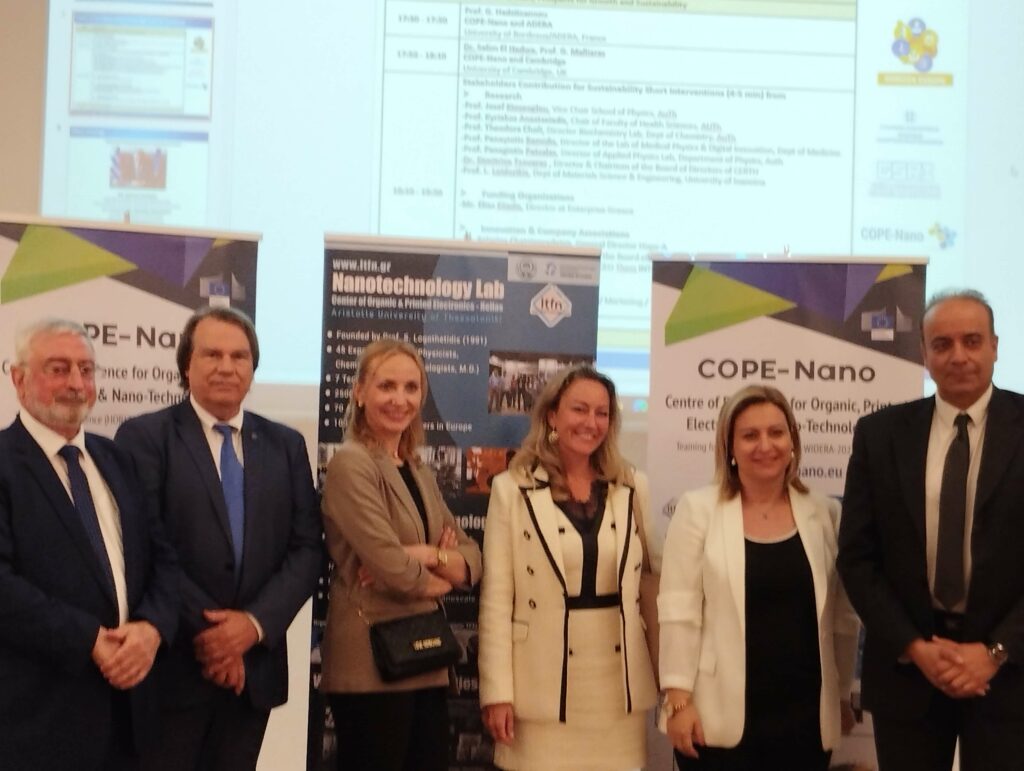From the LTFN Nanotechnology Laboratory of the Aristotle University of Thessaloniki to the Centre of Excellence for Nanotechnologies and Organic Electronics and the 3rd Generation Photovoltaic Production Factory.
How it all began: The Success Story of the LTFN Nanotechnology Laboratory and the Green Energy Production Unit.
It was in the late 1980s when the Greek postdoctoral researcher of the Max Plank Institute, Stergios Logothetidis, transferred piece by piece the instruments for the experiments of the newly established research laboratory in the Physics Department of the Aristotle University of Thessaloniki.

” I remember once when I was flying back from Berlin to Thessaloniki I was stopped at the airport just before I got on the plane. The airport security officers led me to the baggage loading area and asked me to open my luggage packages to find that I was not carrying weapons as they initially suspected but high vacuum steel laboratory equipment for the Laboratory at the University. The flight, although slightly delayed, departed normally for Thessaloniki” recounts the President of Organic Electronic Technologies and coordinator of the COPE-Nano Centre of Excellence for Nanotechnologies and Organic Electronics, Stergios Logothetidis.
This is how the story of the LTFN Nanotechnology Laboratory began in the late 1980s. A success story that evolved into a whole ecosystem around Nanotechnologies and Organic Electronics, creating a 3rd generation photovoltaic production unit, the first in the world, which has helped to create a Nanotechnology and Organic Electronics Centre of Excellence and two dynamic companies Organic Electronic Technologies (OET) which is a world leader in the field of 3rd generation photovoltaics and the nano-medical company BLNanobiomed which creates sensors and nanomaterials for medical applications.
In 1991, the then Associate Professor of the Physics Department at the Aristotle University of Thessaloniki, Stergios Logothetidis, created the first LTFN Nanotechnology Laboratory and gradually introduced the new materials and thin film technologies to the public.
The Laboratory and the team of researchers set up create and investigate the properties of new materials for industrial applications , while participating in major European projects that are gradually changing the industry and its products, not only on a European but also on a global scale.
The new international trend to save raw materials and the need for increasingly light, flexible and smaller electronic devices is paving the way for a number of European projects of excellence.
For more than 35 years, the LTFN Nanotechnology Laboratory has not only been involved in but has been organizing and coordinating dozens of European and national projects in the field of research and development (ISOTECH, TransMach, Flexonics, Olatronics, RoleMak Smartonics, Cornet, Smartline, Realnano, e.t.c)
The Laboratory has evolved into an internationally recognized Center of Excellence with a staff of 30-35 young scientists and specialized researchers, with modern research infrastructure and equipment acquired mainly from competitive research projects. Today it is an international pole of research and innovation and has trained more than 500 students, postgraduate students, PhDs and young researchers, paving the way for a series of innovative activities at the Aristotle University of Thessaloniki and in the wider region. Especially the establishment by the LTFN Laboratory of the world’s first postgraduate course in Nanosciences & Nanotechnologies at the Aristotle University of Thessaloniki, in collaboration with other laboratories from the Departments of Physics, Chemistry, Biology, Polytechnic and Medicine, opened the way for interdisciplinary cooperation and the creation of new scientists, researchers and entrepreneurs with unparalleled capabilities and abilities to create new artifacts and provide solutions to chronic problems.
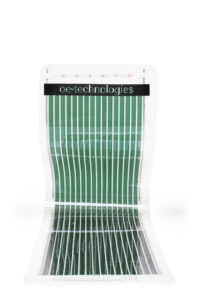
The LTFN Nanotechnology Laboratory has become a world-class institution of excellence in various research areas and directions. It has a laboratory infrastructure of 2500 m2, including 600 m2 clean room facilities and state-of-the-art equipment, 10 pilot lines and several more TestBed facilities,. It has even developed a strong R&D activity in research projects and more than 200 dynamic collaborations with SMEs, industry and academia. LTFN is a digital innovation hub, offering open access to stakeholders (academia, research organisations, SMEs, industry), while acting as a one-stop service for SMEs in terms of technology transfer, from the conception of an idea to the creation of innovative products.
Through a series of actions, the Director of the Laboratory, Professor Stergios Logothetidis, brought the innovation he created with his team and through European research programs to the global market.
Therefore, in the period of economic crisis in Greece, the Greek Association of Organic and Printed Electronics HOPE-A was founded in 2011, in 2012 the company Organic Electronic Technologies was established, which today leads in the field of 3rd generation photovoltaics on a global level and in 2014 the company BLNanobiomed, which applies nanomedical technologies to address medical needs.
Centre of Excellence for Nanotechnologies and Organic Electronics COPE-Nano
The creation of the Centre of Excellence in Nanotechnologies and Organic Electronics COPE-Nano is the evolution of the LTFN Nanotechnology Laboratory, but also the recognition of its research work and the expertise it has acquired at an international level in the field of Organic Electronics (OEs) of thin films and in the technologies of nanomaterials, advanced materials, automation and digital industry.
The COPE-Nano Centre of Excellence, funded with €30 million from European (HORIZON-WIDERA-2022-ACCESS-01) and national resources, is the most advanced European effort to develop basic and applied research in flexible printed organic electronics, bioelectronics and advanced nanomaterials.
The project to establish the COPE-Nano Centre of Excellence is organised and coordinated by the LTFN Nanotechnology Laboratory, Aristotle University of Thessaloniki. The project involves and collaborates with International Institutions of Excellence: The University of Cambridge – UK, and the University of Bordeaux – France. Already more than 30 internationals academic, research and industrial institutions from Europe and the Middle East have expressed strong interest in collaborating and exploiting the infrastructure and results of the COPE-Nano Centre of Excellence.
The COPE-Nano Centre of Excellence will be a modern institution of Excellence, Education, Research, Technology and Innovation and will make Greece a Global Hub of Excellence and Entrepreneurship in Nanotechnologies, Organic Electronics and Nanomedicine.
“Now with COPE-Nano, an expanded research and technology community is being created that will be in constant interaction with industry, as well as with innovative start- ups and spin outs. That community, which will rely on synergies and collaborations with young scientists and researchers to grow, will need to have the independence and capacity to manage the intellectual wealth it will generate to ensure sustainability in the long term,” says COPE-Nano Nanotechnologies and Organic Electronics Centre of Excellence coordinator, Stergios Logothetidis.
The main objectives of the Centre of Excellence include:
– Strengthening the scientific and technological capacity of Greece while increasing and upgrading the research “profile” of Greek scientists, researchers , researchers and entrepreneurs.
– Developing initiatives and business activities with high-tech industries.
– Return of skilled and scientific potential living and working abroad.
The COPE-Nano Centre of Excellence comprises three Institutes:
– Institute of Flexible Organic and Printed Electronics. The main objective of the Institute is the development of flexible and printed organic electronic devices and their applications.
– Institute of Bioelectronics and Nanomedicine. The Institute focuses on the development of bioelectronic devices and applications for the research field of Nanomedicine
– Institute of Advanced Nanomaterials and Nanomechanics. This section is related to the development of advanced nanostructures and nanoprocesses.
3rd generation photovoltaic production unit.
The COPE-Nano Centre of Excellence and the 3rd generation photovoltaic production unit created in Thessaloniki by the European flagship project Flex2Energy have a total budget of 52 million euros. These two European projects will create in the coming years huge development prospects in the growing technologies of organic electronics , through synergies between industry and research groups in Greece, Europe and internationally. 
The Flex2Energy project marks Europe’s future for green industry, green energy production, energy autonomous buildings and greenhouses, and sets an ambitious and critical goal at European level: Mass production of 3rd generation photovoltaics.
The objectives of Flex2Energy include the creation of tools for the mass production of organic translucent PVs, both in the industrial and aesthetic fields, and the manufacture of highly efficient durable printed products of integrated PVs at competitive prices, installed in Buildings, Greenhouses and Electric Car Roofs.
The coordination of the European project, which lasts 48 months and has a total budget of 21.3 million euros, is being carried out by the Greek company OET, a global leader in the field of 3rd generation PV.
A total of 15 industrial and research institutions in Europe are participating in Flex2Energy: Six operators from Greece (OET, ALOUMIL, AUTH Nanotechnology Laboratory, HOPE-A, DEPIA, Kyriakidis), three from France (Pole-Fibres, INCORE, IPC) , and one from Germany (Coatema), Spain (Mondragon), Hungary (SEMILAB), Lithuania (WOP), Italy (Stellantis Fiat), and Romania (Municipality of Alba Julia).
, and one from Germany (Coatema), Spain (Mondragon), Hungary (SEMILAB), Lithuania (WOP), Italy (Stellantis Fiat), and Romania (Municipality of Alba Julia).
“With Flex2Energy, we are not just building a factory in Thessaloniki, but we are building a solid industry, green and digital. We are building a factory, which integrates industry 4.0 and industry 5.0 technologies in new machines, new instruments and automation, all developed on new hardware, as well as in processes and software, and all this paves the way for a great circle of value, intellectual rights, know-how, which goes beyond our country and Europe”, Mr. Logothetidis stresses.
EDITOR: STELINA MARGARITIDOU
